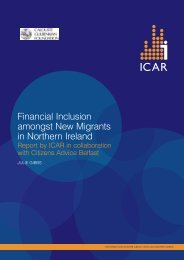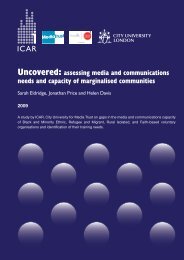The Somali community in the UK: What we know and how we ... - ICAR
The Somali community in the UK: What we know and how we ... - ICAR
The Somali community in the UK: What we know and how we ... - ICAR
You also want an ePaper? Increase the reach of your titles
YUMPU automatically turns print PDFs into web optimized ePapers that Google loves.
London, Liverpool, <strong>and</strong> Manchester. Refugee<br />
Action’s report on <strong>the</strong> north <strong>we</strong>st of Engl<strong>and</strong><br />
records a “small number” of <strong>Somali</strong>s <strong>in</strong> Warr<strong>in</strong>gton<br />
(Smyth <strong>and</strong> Mohamed, 1997: 17) <strong>and</strong> <strong>in</strong> <strong>the</strong><br />
Lancashire districts of Chorley <strong>and</strong> South Ribble<br />
(ibid: 20). <strong>The</strong> 2001 census lists several areas with<br />
fe<strong>we</strong>r than 100 <strong>Somali</strong>s. Apart from Leeds <strong>and</strong><br />
Southampton, <strong>the</strong>se <strong>in</strong>clude Oxford, Read<strong>in</strong>g,<br />
Middlesbrough, Bedford, Watford, Sou<strong>the</strong>nd, <strong>and</strong><br />
Sw<strong>in</strong>don.<br />
<strong>The</strong> particular needs of <strong>Somali</strong>s <strong>in</strong> areas where<br />
<strong>the</strong>re are only small numbers are as significant as<br />
those <strong>in</strong> cities with higher settlement. But lack of<br />
numerical data h<strong>in</strong>ders sound service delivery <strong>in</strong><br />
all regions. In his study of <strong>The</strong> <strong>Somali</strong> <strong>community</strong> <strong>in</strong><br />
Liverpool (2000) Stokes po<strong>in</strong>ts out that <strong>the</strong>re is no<br />
ethnic monitor<strong>in</strong>g <strong>in</strong> any field - health, education,<br />
employment, crime. This makes it impossible to<br />
plan <strong>and</strong> produce local services on an accurate<br />
assessment of need - whe<strong>the</strong>r estimates are made<br />
by a local authority or <strong>Somali</strong>s <strong>the</strong>mselves.<br />
Ho<strong>we</strong>ver, even if accurate figures are not yet<br />
available, <strong>the</strong> ma<strong>in</strong> areas of concern for <strong>Somali</strong>s<br />
have been <strong>we</strong>ll documented. <strong>The</strong> purpose of this<br />
present addition to <strong>the</strong> literature is not only to<br />
draw toge<strong>the</strong>r <strong>how</strong> <strong>we</strong> <strong>know</strong> what <strong>we</strong> <strong>know</strong> about<br />
<strong>Somali</strong>s <strong>in</strong> <strong>the</strong> <strong>UK</strong>, but also to highlight anxieties<br />
expressed by <strong>Somali</strong>s <strong>the</strong>mselves. <strong>The</strong>se may differ<br />
accord<strong>in</strong>g to geographical area, gender or particular<br />
group - education for some, health for o<strong>the</strong>rs. But<br />
it is strik<strong>in</strong>g <strong>how</strong> far <strong>the</strong> reports from different<br />
parts of <strong>the</strong> <strong>UK</strong> replicate each o<strong>the</strong>r <strong>and</strong> d<strong>we</strong>ll on<br />
identical problems. Employment, education, physical<br />
<strong>and</strong> mental health, <strong>the</strong> particular tensions around<br />
youth <strong>and</strong> gender, toge<strong>the</strong>r with <strong>the</strong> <strong>in</strong>ternal<br />
divisions <strong>in</strong> <strong>the</strong> <strong>community</strong>, are all raised as critical<br />
issues by <strong>Somali</strong>s throughout <strong>the</strong> <strong>UK</strong>.<br />
Employment<br />
In <strong>the</strong> early t<strong>we</strong>ntieth century <strong>Somali</strong>s arrived<br />
<strong>in</strong> Brita<strong>in</strong> to work. But, as <strong>we</strong> have seen, seamen<br />
lost <strong>the</strong>ir jobs after <strong>the</strong> war. Those that did not<br />
f<strong>in</strong>d work <strong>in</strong> <strong>the</strong> <strong>in</strong>dustrial <strong>and</strong> manufactur<strong>in</strong>g<br />
sectors became unemployed, <strong>and</strong> now many<br />
of those arriv<strong>in</strong>g later as refugees have jo<strong>in</strong>ed<br />
<strong>the</strong>ir ranks. No accurate figures are available, but<br />
1987 estimates put <strong>the</strong> To<strong>we</strong>r Hamlets <strong>Somali</strong><br />
unemployment rate at 87% (El-Solh, 1991: 550,<br />
note 13), with 95% <strong>in</strong> Liverpool out of work<br />
(Xifaras, 1996: 26). Estimates s<strong>in</strong>ce <strong>the</strong>n s<strong>how</strong><br />
a slight improvement, but noth<strong>in</strong>g which would<br />
<strong>in</strong>dicate a gradual <strong>in</strong>tegration of <strong>Somali</strong>s <strong>in</strong>to <strong>the</strong><br />
British labour force. A 1993 Liverpool study gave<br />
an unemployment figure of 72.6% (Granby Toxteth<br />
Community Project, 1993: 36). Two years later,<br />
Ditmars (1995: 8) reckoned that 80% of <strong>Somali</strong>s<br />
<strong>in</strong> London <strong>we</strong>re out of work. Contemporary<br />
estimates no longer <strong>in</strong>clude <strong>the</strong> older settlers<br />
who have retired, but reflect <strong>the</strong> employment of<br />
refugees. One estimate for <strong>the</strong> unemployment rate<br />
among <strong>Somali</strong> men <strong>in</strong> 1999 was 87% (Frieda <strong>and</strong><br />
Walters, 1999: 26). Studies also f<strong>in</strong>d that a high<br />
proportion of <strong>Somali</strong>s have never worked s<strong>in</strong>ce<br />
com<strong>in</strong>g to <strong>the</strong> <strong>UK</strong>.<br />
This does not appear to depend solely on<br />
<strong>the</strong> fact that <strong>Somali</strong>s are members of a black<br />
m<strong>in</strong>ority. On <strong>in</strong>dicators such as levels of pay, or<br />
<strong>the</strong> permanence of <strong>the</strong> post, <strong>Somali</strong> refugees fare<br />
worse than o<strong>the</strong>r ethnic populations as a whole<br />
(Bloch, 2003). Is it <strong>the</strong>n just a matter of education?<br />
<strong>The</strong> educational profile of early settlers, who<br />
often came from a nomadic background, has<br />
contributed to <strong>the</strong> impression that <strong>Somali</strong>s are<br />
less educated than o<strong>the</strong>r refugee communities.<br />
Figures on qualifications are also slanted by <strong>the</strong><br />
lo<strong>we</strong>r educational level of women, <strong>and</strong> of many<br />
young people who have missed out on school<strong>in</strong>g<br />
<strong>in</strong> <strong>Somali</strong>a <strong>and</strong> have been unable to catch up <strong>in</strong><br />
<strong>the</strong> <strong>UK</strong>. But it is often <strong>the</strong> case that refugees <strong>and</strong><br />
asylum seekers come from <strong>the</strong> better-educated<br />
sections of <strong>the</strong>ir society, <strong>the</strong> social strata which<br />
could raise <strong>the</strong> money to escape. <strong>Somali</strong>s are no<br />
exception - <strong>the</strong> <strong>community</strong> <strong>in</strong> fact conta<strong>in</strong>s a large<br />
number of highly qualified men <strong>and</strong> women.<br />
<strong>Somali</strong>s constantly express frustration that this is<br />
not recognised, <strong>and</strong> po<strong>in</strong>t to <strong>the</strong> underutilisation of<br />
<strong>the</strong>ir professional skills - doctors driv<strong>in</strong>g m<strong>in</strong>icabs,<br />
teachers unemployed. This is confirmed by a recent<br />
study by Bloch <strong>and</strong> Atfield (2002) who surveyed<br />
82. Dr. Hermione Lovel, personal communication to Kirsteen Tait, <strong>ICAR</strong>,<br />
K<strong>in</strong>g’s College London.<br />
83. O. Hassan, Birm<strong>in</strong>gham Support Group: <strong>in</strong>terview 8.4.03<br />
<strong>The</strong> <strong>Somali</strong> <strong>community</strong> <strong>in</strong> <strong>the</strong> <strong>UK</strong><br />
39

















